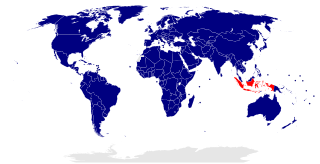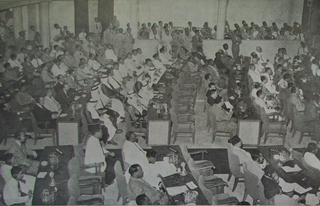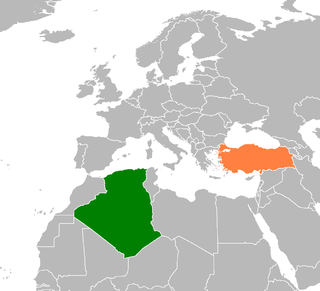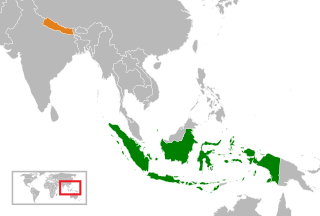
Since independence, Indonesian foreign relations have adhered to a "free and active" foreign policy, seeking to play a role in regional affairs commensurate with its size and location but avoiding involvement in conflicts among major powers. During the Presidency of Sukarno, Indonesia's Foreign Relations were marked by engagement with other newly independent nations in Asia and Africa, as exemplified by the Bandung Conference, the subsequent foundation of the Non-Aligned Movement and a confrontational attitude towards Western powers, justified by a belief in the CONEFO and opposition to what Sukarno termed as NEKOLIM.

Since its independence from France in 1962, Algeria has pursued an activist foreign policy. In the 1960s and 1970s, Algeria was noted for its support of Third World policies and independence movements. Since its independence, Algeria has been a member of the Arab League, the African Union and of the United Nations.

The first large-scale Asian–African or Afro–Asian Conference —also known as the Bandung Conference—was a meeting of Asian and African states, most of which were newly independent, which took place on 18–24 April 1955 in Bandung, West Java, Indonesia. The twenty-nine countries that participated represented a total population of 1.5 billion people, 54% of the world's population. The conference was organized by Indonesia, Burma (Myanmar), India, Ceylon, and Pakistan and was coordinated by Ruslan Abdulgani, secretary general of the Ministry of Foreign Affairs of the Republic of Indonesia.

Russia has an embassy in Algiers and a consulate in Annaba, and Algeria has an embassy in Moscow. Algeria currently enjoys very strong relations with Russia.

Algeria has an embassy in Ankara, and a general consulate in Istanbul. Turkey has an embassy in Algiers. Both countries are full members of the Union for the Mediterranean.

Indonesia and Myanmar established diplomatic relations in 1949. Indonesia has an embassy in Yangon, while Myanmar has an embassy in Jakarta.

Indonesia and Laos established diplomatic relations in 1957. Indonesia has an embassy in Vientiane, while Laos have an embassy in Jakarta. Indonesia supported and welcomed Laos membership to the Association of Southeast Asian Nations (ASEAN) on 23 July 1997. Laos and Indonesia agreed to enhance relations to focus on exploring the potential of both nations to cooperate on trade and investment. The two nations expressed a desire to reach further agreements relating to security, tourism, sport, air transport and education. The two sides will also work together in cooperation with other ASEAN nations to ensure the ASEAN Community is established in 2015.

Indonesia and Sri Lanka established diplomatic relations in 1952. Both nations share some cultural similarities. Indonesia and Sri Lanka are members of the World Trade Organization. They are founding members of the Non-Aligned Movement. Indonesia has an embassy in Colombo, while Sri Lanka has an embassy in Jakarta.

Indonesia and Nepal established diplomatic relations in 1960. Neither country has a resident ambassador. Indonesia only establishes honorary consulate in Kathmandu, while its embassy in Dhaka, Bangladesh, is also accredited to Nepal. Nepal, on the other hand, accredited its embassy in Bangkok, Thailand, also to Indonesia. Both nations are also partners and founding members of the Non-Aligned Movement (NAM).

Indonesia and Nigeria established diplomatic relations 1965. Both countries are members of multilateral organizations such as the Non-Aligned Movement, World Trade Organization (WTO), Organisation of Islamic Cooperation (OIC) and Developing 8 Countries. Indonesia has an embassy in Abuja and Nigeria has an embassy in Jakarta.

Indonesia and Morocco established diplomatic relations in 1960. Both are the Muslim-majority countries; Indonesia is the most populous Muslim country in the world, while Morocco is also a Muslim majority nation. Morocco praised Indonesia as a strong democratic nation, and pointed out that both nations face the same challenges of separatism and terrorism. Diplomatic relations were established in 1960. Indonesia has an embassy in Rabat and a consulate in Casablanca, while Morocco has an embassy in Jakarta. Both nations are members of the World Trade Organization (WTO), Non-Aligned Movement and Organisation of Islamic Cooperation (OIC).

Austria and Indonesia established diplomatic relations in 1954. Austria recognizes Indonesia as a stable and reliable partner, and both countries enjoy excellent relations. The two nations have agreed to expand relations in business, trade and investment, tourism, culture, environment and green technology. Austria has an embassy in Jakarta and honorary consulates in Yogyakarta, Bandung and Surabaya, while Indonesia has an embassy in Vienna that is also accredited to Slovenia as well as the Vienna-based multilateral organizations, such as IAEA, PrepCom CTBTO, UNIDO, UNODC and UNOOSA.

Indonesia and Tanzania established diplomatic relations in 1964. The relations between both nations are mostly in agriculture sector, where Indonesia provides training for Tanzanian farmers. In 2011 both countries established Indonesia-Tanzania Joint Agriculture Cooperation Committee (JACC), as a vehicle to improve agricultural sector co-operations, such as capacity building through training, joint research, and the expansion of market access to agricultural products. Indonesia has an embassy in Dar es Salaam. Tanzania has a non-resident ambassador in Kuala Lumpur, Malaysia. Both countries are members of multilateral organisations such as World Trade Organization (WTO), the Group of 77 and Non-Aligned Movement.

Indonesia and Tunisia established diplomatic relations in 1960. In early 2010s, relations are particularly important following the Arab Spring, as Tunisia seeks Indonesia as an example of democracy in a Muslim-majority country, while Indonesia has expressed its willingness to support the democratic transition in Tunisia through a capacity for building and a partnership in democracy. Indonesia has described Tunisia as a shining example of a democratic transition in the Arab World. The diplomatic relations dated back to the 1950s when Indonesia supports Tunisian independence from France. Indonesia has an embassy in Tunis, while Tunisia has an embassy in Jakarta. Both countries are members of the Organisation of Islamic Cooperation and the Non-Aligned Movement.

Ecuador–Indonesia relations refer to bilateral relations between Ecuador and Indonesia. Relations were established on April 29, 1980, however it was not until November 2004 that Ecuador established their embassy in Jakarta, and reciprocated 6 years later on November 11, 2010 that Indonesia finally opened its embassy in Quito. Both countries are the members of Forum of East Asia-Latin America Cooperation and Non-Aligned Movement.

Indonesia–Uzbekistan relations was officially established on June 23, 1992. Both countries have recognized importance of each other's potential; Uzbekistan realized the strategic importance of Indonesia, home to the world's biggest Muslim population and Southeast Asia’s biggest economy, while Indonesia recognize Uzbekistan strategic importance as the gate to Central Asia, a growing economy also a potential market. Indonesia has an embassy in Tashkent, while Uzbekistan has an embassy in Jakarta. Both countries have Muslim-majority population and both are members of Organisation of Islamic Cooperation.

Indonesia–Sudan relations was officially established in 1960. In February 2012, during a visit of Sudanese Foreign Minister Ali Karti to Jakarta, Indonesia and Sudan has agreed to foster bilateral relations in politics, science, education and economic sectors. Indonesia has an embassy in Khartoum, while Sudan has an embassy in Jakarta. Both countries have Muslim-majority population and both are members of Organisation of Islamic Cooperation.

Foreign relations were officially established in 1992. Azerbaijan appreciates Indonesia's support in international forums on Azerbaijan position regarding the Nagorno-Karabakh conflict. Azerbaijan has an embassy in Jakarta while Indonesia has an embassy in Baku. Both nations are the member of Organization of Islamic Cooperation and Non Aligned Movement.

Algeria–Syria relations refers to the relationship between the People's Democratic Republic of Algeria and the Syrian Arab Republic. Algeria has an embassy in Damascus; while Syria has an embassy in Algiers. Both are members of the Arab League. Algeria is one of the few Arab countries that maintains tie with the Syrian Government under Bashar al-Assad, and has defended the government within the Arab League.

The Non-Aligned Movement (NAM) is a forum of 120 countries that are not formally aligned with or against any major power bloc. After the United Nations, it is the largest grouping of states worldwide.






















